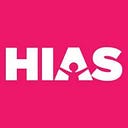By Beverly Goldberg
Five years ago, after being attacked, beaten, and imprisoned for opposing the government in her native Nicaragua, Erika Sanchez fled to Costa Rica. Soon after her arrival, she came into contact with HIAS, whose local staff provided her with psychological counseling and helped get her residency documents in order. Despite this assistance, her early days there were difficult. Sanchez, a 36-year-old trained nurse, worked different jobs to make ends meet but struggled to support her family. How would she sustain herself going forward in her new home?
HIAS’ Graduation Model Approach (GMA) provided a solution. The GMA is a socio-economic development program that consists of providing participants with psychological support and training to help them achieve sustainable livelihoods and improve the well-being of their family. After completing the training, participants receive follow-up support, counseling, and coaching from HIAS staff to ensure that their chances of success are increased. For Sanchez, the GMA was about much more than how to make a living.
“One of the first things we learned was the importance of eating three nutritious meals a day and at set times, and also to plan our meals in advance,” said Sanchez. “I also created a significant support network with the other women in the course and learned that it’s really important to have savings. Now I have a savings mentality, which I never had before.”
The GMA is a core element of HIAS’ economic inclusion program in Latin America and the Caribbean. The model is a powerful tool that allows forcibly displaced people to participate equitably in all aspects of life in their host communities. It focuses on providing people with long-term solutions to the difficulties faced when migrating to a host country by helping them create support networks and sustainable income streams and to improve their psychological resilience.
HIAS achieves this through a holistic approach that provides program participants with legal support, mental health support, entrepreneurship programs, skills training workshops, seed capital opportunities, and follow-up support.
Over the years, more than 16,000 forcibly displaced survivors of gender-based violence (GBV), women at risk, LGBTQ community members, and others have benefitted from HIAS’ economic inclusion programs. “HIAS understands the importance of programming that addresses the particular needs of these groups, from a GBV mitigation perspective, but also to promote their economic empowerment, preparing them to access the labor market,” says Galo Quizanga, HIAS’ Global Director for Economic Inclusion.
A total of 70% of participants in HIAS’ economic inclusion program successfully improved their self-sufficiency after taking part. Of those who created new businesses during the program, 60% of these businesses continued to generate sustainable incomes one year after program completion, and 15% of businesses generated new jobs in the community.
The GMA, which targets families living in extreme poverty — less than $1.25 a day in the Latin America and Caribbean region — and who have difficulty accessing vital services in their communities, is a fundamental element of this program. In Costa Rica, HIAS is currently carrying out the GMA with 70 family groups of refugees and asylum seekers, with the support of the U.S. Bureau of Population, Refugees, and Migration (PRM) and UNHCR.
“Through support and close accompaniment for 18 to 24 months, the GMA seeks to provide refugee and asylum-seeking families in Costa Rica with a sustainable and secure livelihood, savings for emergencies, improvement in their nutrition, and effective integration into their communities,” says Angie Solorzano, HIAS Costa Rica’s economic inclusion coordinator.
As part of the GMA, Sanchez participated in HIAS’ entrepreneurship school with a gender lens. The school provides training to LGBTQ people, GBV survivors, and women at risk through a model of empowerment that promotes participant autonomy and psychological resilience. It was during this time that the idea to open up her own restaurant started to come to life.
“During the course, I learned about managing finances for a business. I learned about how to keep track of monthly profits and expenses, and how to make sure I’m always putting money aside. Now, I have my own restaurant,” Sanchez said. At her restaurant, she serves up food from Nicaragua and Costa Rica, helping her to feel connected to her two homes at once.
HIAS provided Sanchez with legal support to get the permits she needed to open the restaurant, and also assisted her in the negotiation process with the owner of the restaurant building. Now, she’s serving 25 lunches a day, and her typical Nicaraguan buñuelos, fried sweet cheese cakes, are flying off the shelves. “I also do a special Nicaraguan barbecue every weekend, where I serve people different types of meat with fresh corn flour tortillas,” she said. “This usually attracts a lot of customers.”
Now, Sanchez is close to graduating from the program after complying with the requisites in relation to the four key areas. “For people to be able to graduate from the GMA, they must be eating properly, saving 5% of their monthly income, sustaining their families, and have made use of support networks in their community for a period of six months,” said Marcela Aguilera, HIAS Costa Rica’s Economic Inclusion Officer.
HIAS Costa Rica expects 60% of all participants of the GMA to successfully graduate from the program in September when it will come to an end. This means that 60% of all participants will have gained self-sufficiency for themselves and their families, and will have integrated into their host communities in Costa Rica.
“Our intervention in general aims for the people we serve to achieve self-sufficiency, because we believe that economic inclusion is a tool for protection, achieving not only inclusion in economic life but also promoting social welfare and empowerment,” said Solorzano.
Originally published at https://hias.org on July 31, 2023.
